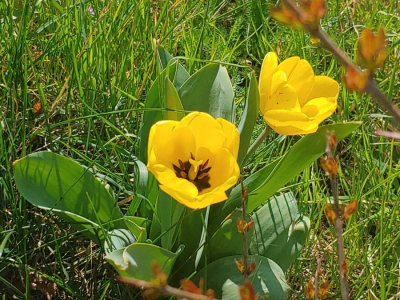stdClass Object
(
[id] => 16147
[title] => God, please: rise!
[alias] => god-please-rise
[introtext] => The soul and the harp/ 3 - Fatherhood is the wonderful art of liberating our children from their crosses
By Luigino Bruni
Published in Avvenire 12/04/2020
"I am dirty, Milena, infinitely dirty, this is why I make so much fuss about purity. Nobody sings as purely and clearly as those in the deepest hell: it is their song that we mistake for the choirs of angels"
Franz Kafka, Letters to Milena
Psalm 3 is a wonderful commentary on Jesus' passion, death and resurrection, which contains one of the most human and greatest prayers in the Bible.
Before being a truth of the Christian faith, resurrection was always a fundamental anthropological experience. It is part of the human repertoire, an exercise that men and women know well, an essential gesture. Homo sapiens is an animal capable of resurrection. We also perceive it in that ineffable but real sign that we see in the last glance of those we love, where we feel that that greeting is not the last goodbye. And once death learns to stay in the second last place - and it takes a whole life to learn this - it becomes "death our friend". If men and women had not already died and risen many times over, if they had not prayed and waited for it for centuries, we would not have been able to recognize that resurrection, similar and different, on the first day after Saturday. He would have called us by name and we would have confused his voice with that of the keeper of the gardens.
[fulltext] =>
After the first two introductory psalms, psalms of blessings and beatitudes, with Psalm 3 we enter the territory of prayer. This psalm is attributed to David, with the title: “Psalm of David. When he fled before his son Absalom". The ancient scribe who added this title knew the story of David well and therefore placed this prayer in one of the most terrible moments in the life of the king of Jerusalem: the uprising of his son Absalom. Beyond the (dubious) historicity of this heading, the title of the psalm nevertheless tells us some very important things - it is best not to discard anything from the Bible. From the second book of Samuel, we know that following the uprising of Absalom - the breathtakingly beautiful prince with the wonderful hair - David had to flee Jerusalem: «The whole countryside wept aloud as all the people passed by. The king also crossed the Kidron Valley, and all the people moved on toward the wilderness» (2 Samuel 15,23). An exodus in the opposite direction, an escape not towards Easter but towards a passion: «David continued up the Mount of Olives, weeping as he went; his head was covered and he was barefoot» (2 Samuel 15,30). The via dolorosa of the most beloved king of all.
It is within this context that the psalmist sings: «Lord, how many are my foes! How many rise up against me! Many are saying of me, “God will not deliver him!”» (Psalm 3,1-2). We are in a context of great danger, the psalmist feels besieged by enemies and adversaries. In this concrete difficulty and within this fear, a religious question also begins to insinuate itself within that man. The greatest evidence in the Bible is never merely material; it is their religious and spiritual meaning that makes them into something serious and often terrible. The biblical man is not that afraid of pain and death, but he is afraid of pain and death interpreted as the judgment of God and therefore moral condemnation. That death threat then becomes a question regarding the justice of the life lead by the author of the psalm, an immediately religious question: «God will not deliver him». Hell in the Bible is non-salvation, a salvation that however should not be placed in the future tense; in the biblical world paradise is found under the present sun, the promised land is a piece of our own land. And a lack of salvation is seen as the non-intervention of God in misfortune. YHWH is a true God and not a mere shallow idol because he is a concrete God, who therefore intervenes in life; and if he does nothing, it is a sign that the man / people in difficulty do not deserve the intervention of God because of some fault of their own. The silence of God becomes a sign of guilt: «We considered him punished by God, stricken by him, and afflicted» (Isaiah 53,4). We cannot fully understand the theological and ethical controversy between Job and his friends (and with God) if we are not also fully aware that Job wants to challenge this religious idea, that was so widespread in the ancient world as well as in some biblical passages. We also find the same challenge in Psalm 3.
However, in order to further understand other invisible and important words hidden between the lines of Psalm 3, we must go back to the story of David and his escape from Absalom. While David is leaving Jerusalem in tears, Shimei, a descendant of Saul, «pelted David and all the king’s officials with stones, though all the troops… As he cursed, Shimei said, “Get out, get out, you murderer, you scoundrel! ...The Lord has given the kingdom into the hands of your son Absalom. You have come to ruin because you are a murderer!”» (2 Samuel 16,5-8). A terrible accusation: Shimei reads Absalom's rebellion against David as a penalty of retaliation for David's rebellion against his "father" Saul. But David does not defend himself, he accepts the stones being flung at him and says: «Leave him alone; let him curse, for the Lord has told him to» (2 Samuel 16,11). There is no wiser and meeker way than this to interpret the stones that life and others throw at us. Once again, however, we find that theological interpretation of misfortune, in David as well.
In the original Hebrew text of Psalm 3, after verse three we find the word selah: "take a break". The text invites the reader or the community gathered in the temple or later in the synagogue to stop and take a breath before continuing the song: «The word selah, which is neither read nor sung, urges us to remain silent and firm in the meditation of the meaning: invites us to a meditation of the heart» (Martin Luther). We too take a break here, and regain our breath... In the inner space created by this silence, we find ourselves in Jerusalem, once again crossing the Kidron valley and reaching the Mount of Olives. Then we accompany a descendant of David, a new "Son of God", out of the city, to another mountain. And in the end, we hear words very similar, too similar, to those of Psalm 3: «He trusts in God. Let God rescue him now if he wants him, for he said, "I am the Son of God!"» (Matthew 27,43). Not even that man was able to silence the enemies who cursed him. Again, there was a strong fear that the abandonment of men was also the abandonment of God, in that moment too: «My God, my God, why have you forsaken me?» (Matthew 27,46).
Now, we can continue reading the psalm: «But you, Lord, are a shield around me, my glory, the One who lifts my head high. I call out to the Lord, and he answers me from his holy mountain» (Psalm 3,4-5). I call out to the Lord, and he answers me. In the man David and in Jesus of Nazareth the doubt arises that that pain, those persecutions and that abandonment had something to do with God - "for the Lord has told him to". They were children of a world where everything was a symbol, everything contained divine messages. Nevertheless, if we look at human suffering from God’s perspective, we are able to discover something different in the Bible - the Bible is also and above all a liberation from the wrong messages that we attribute to God. This psalm tells us that when we cry out our abandonment "the Lord answers": «I lie down and sleep; I wake again, because the Lord sustains me. I will not fear though tens of thousands assail me on every side» (Psalm 3,6-7). An image that touches that of the newborn baby who falls asleep safely and serene in his mother's arms, while the battle rages outside.
The Bible calls man "son of God" (Psalm 2). When a son is crucified, out of malice or by the events of life, his father will do anything to remove him from the cross, and if he cannot, he will stand beside him and die with him. A father will never be on the side of the soldiers preparing the gallows, because fatherhood is the wonderful art of liberating your children from their crosses. The Holy Trinity is not only an abstract theorem, and the first stabat of Holy Saturday is in fact that of the Father. The passion, death and resurrection of Christ are neither praise nor justification for human suffering - any reader who approaches those pages of the Gospels without the back-up of a proper ideology, will only find a story of the unjust suffering of an innocent man who continued to love despite all that cruelty. God our Father continues to read and relive that same story with us over and over again. He continues to suffer every time while re-hearing his son cry out, the echo of which has not yet died out, because it will only die out on the very last day. He cries just like us, while he sees his son, a new Sisyphus, continue to retrace the same Via Crucis every day.
It is right there, on top of the infinite Golgotha of history, that another wonderful surprise enclosed in the psalm awaits us: «Arise, Lord! Deliver me, my God!» (Psalm 3,7). After sleep there is awakening, after death there is resurrection: «Perhaps because of the fatal quiet you are the imago, come so dear to me, o evening» (Ugo Foscolo). The resurrection of God is the first fruit of our resurrection. God must rise so that we can rise as well. That is why the first prayer is to ask God, in a loud voice, to rise again after the night, to rise again after death. Hence, in the first psalm of prayer, in fact, we find the greatest of prayers: God arise, rise again, arise, because you must rise again, you cannot leave us in this infinite Holy Saturday. There is no more human prayer than this: God, I beg of you, please rise again. The prayer of those who believe, but also the prayer of those who have lost their faith, of those who want to start believing again after the death of God.
For centuries, the singers and cantors of the psalms had loudly asked God to rise again. Hence, we too can imagine Abel, Dina, and Agar, Job, Rizpah, Naboth, the daughter of Jephthah, and all the victims of the Bible, waiting and praying, on that Saturday night in front of the sepulcher. Their prayers were also there in that Resurrection. Today we have ours, and while we see the crucifix inexorably retrace his painful path, we cannot stop praying and ask him to rise again, to implore that his resurrections are more than his deaths - at least one more time: «We must imagine Sisyphus happy» (Albert Camus).
Happy Easter.
Download article in pdf
[checked_out] => 609
[checked_out_time] => 2023-05-21 17:33:16
[catid] => 1007
[created] => 2020-04-11 18:42:38
[created_by] => 4501
[created_by_alias] => Luigino Bruni
[state] => 1
[modified] => 2023-05-21 17:33:16
[modified_by] => 609
[modified_by_name] => Super User
[publish_up] => 2020-04-18 02:42:04
[publish_down] => 0000-00-00 00:00:00
[images] => {"image_intro":"","float_intro":"","image_intro_alt":"","image_intro_caption":"","image_fulltext":"","float_fulltext":"","image_fulltext_alt":"","image_fulltext_caption":""}
[urls] => {"urla":false,"urlatext":"","targeta":"","urlb":false,"urlbtext":"","targetb":"","urlc":false,"urlctext":"","targetc":""}
[attribs] => {"article_layout":"","show_title":"","link_titles":"","show_tags":"","show_intro":"","info_block_position":"","info_block_show_title":"","show_category":"","link_category":"","show_parent_category":"","link_parent_category":"","show_associations":"","show_author":"","link_author":"","show_create_date":"","show_modify_date":"","show_publish_date":"","show_item_navigation":"","show_icons":"","show_print_icon":"","show_email_icon":"","show_vote":"","show_hits":"","show_noauth":"","urls_position":"","alternative_readmore":"","article_page_title":"","show_publishing_options":"","show_article_options":"","show_urls_images_backend":"","show_urls_images_frontend":"","helix_ultimate_image":"images\/2020\/04\/11\/L'anima-e-la-creta-3.png","helix_ultimate_image_alt_txt":"","spfeatured_image":"","helix_ultimate_article_format":"standard","helix_ultimate_audio":"","helix_ultimate_gallery":"","helix_ultimate_video":"","video":""}
[metadata] => {"robots":"","author":"","rights":"","xreference":""}
[metakey] =>
[metadesc] =>
[access] => 1
[hits] => 1117
[xreference] =>
[featured] => 1
[language] => en-GB
[on_img_default] =>
[readmore] => 9707
[ordering] => 1
[category_title] => EN - The soul and the harp
[category_route] => commenti-biblici/serie-bibliche/it-l-anima-e-la-cetra
[category_access] => 1
[category_alias] => en-the-soul-and-the-harp
[published] => 1
[parents_published] => 1
[lft] => 133
[author] => Luigino Bruni
[author_email] => lourdes.hercules.91@gmail.com
[parent_title] => IT - Serie bibliche
[parent_id] => 773
[parent_route] => commenti-biblici/serie-bibliche
[parent_alias] => serie-bibliche
[rating] => 0
[rating_count] => 0
[alternative_readmore] =>
[layout] =>
[params] => Joomla\Registry\Registry Object
(
[data:protected] => stdClass Object
(
[article_layout] => _:default
[show_title] => 1
[link_titles] => 1
[show_intro] => 1
[info_block_position] => 0
[info_block_show_title] => 1
[show_category] => 1
[link_category] => 1
[show_parent_category] => 1
[link_parent_category] => 1
[show_associations] => 0
[flags] => 1
[show_author] => 0
[link_author] => 0
[show_create_date] => 1
[show_modify_date] => 0
[show_publish_date] => 1
[show_item_navigation] => 1
[show_vote] => 0
[show_readmore] => 0
[show_readmore_title] => 0
[readmore_limit] => 100
[show_tags] => 1
[show_icons] => 1
[show_print_icon] => 1
[show_email_icon] => 1
[show_hits] => 0
[record_hits] => 1
[show_noauth] => 0
[urls_position] => 1
[captcha] =>
[show_publishing_options] => 1
[show_article_options] => 1
[save_history] => 1
[history_limit] => 10
[show_urls_images_frontend] => 0
[show_urls_images_backend] => 1
[targeta] => 0
[targetb] => 0
[targetc] => 0
[float_intro] => left
[float_fulltext] => left
[category_layout] => _:blog
[show_category_heading_title_text] => 0
[show_category_title] => 0
[show_description] => 0
[show_description_image] => 0
[maxLevel] => 0
[show_empty_categories] => 0
[show_no_articles] => 1
[show_subcat_desc] => 0
[show_cat_num_articles] => 0
[show_cat_tags] => 1
[show_base_description] => 1
[maxLevelcat] => -1
[show_empty_categories_cat] => 0
[show_subcat_desc_cat] => 0
[show_cat_num_articles_cat] => 0
[num_leading_articles] => 0
[num_intro_articles] => 14
[num_columns] => 2
[num_links] => 0
[multi_column_order] => 1
[show_subcategory_content] => -1
[show_pagination_limit] => 1
[filter_field] => hide
[show_headings] => 1
[list_show_date] => 0
[date_format] =>
[list_show_hits] => 1
[list_show_author] => 1
[list_show_votes] => 0
[list_show_ratings] => 0
[orderby_pri] => none
[orderby_sec] => rdate
[order_date] => published
[show_pagination] => 2
[show_pagination_results] => 1
[show_featured] => show
[show_feed_link] => 1
[feed_summary] => 0
[feed_show_readmore] => 0
[sef_advanced] => 1
[sef_ids] => 1
[custom_fields_enable] => 1
[show_page_heading] => 0
[layout_type] => blog
[menu_text] => 1
[menu_show] => 1
[secure] => 0
[helixultimatemenulayout] => {"width":600,"menualign":"right","megamenu":0,"showtitle":1,"faicon":"","customclass":"","dropdown":"right","badge":"","badge_position":"","badge_bg_color":"","badge_text_color":"","layout":[]}
[helixultimate_enable_page_title] => 1
[helixultimate_page_title_alt] => The soul and the harp
[helixultimate_page_subtitle] => Biblical Commentaries
[helixultimate_page_title_heading] => h2
[page_title] => The soul and the harp
[page_description] =>
[page_rights] =>
[robots] =>
[access-view] => 1
)
[initialized:protected] => 1
[separator] => .
)
[displayDate] => 2020-04-11 18:42:38
[tags] => Joomla\CMS\Helper\TagsHelper Object
(
[tagsChanged:protected] =>
[replaceTags:protected] =>
[typeAlias] =>
[itemTags] => Array
(
[0] => stdClass Object
(
[tag_id] => 18
[id] => 18
[parent_id] => 1
[lft] => 33
[rgt] => 34
[level] => 1
[path] => luigino-bruni
[title] => Luigino Bruni
[alias] => luigino-bruni
[note] =>
[description] =>
[published] => 1
[checked_out] => 0
[checked_out_time] => 0000-00-00 00:00:00
[access] => 1
[params] => {"tag_layout":"","tag_link_class":"label label-info"}
[metadesc] =>
[metakey] =>
[metadata] => {"author":"","robots":""}
[created_user_id] => 611
[created_time] => 2015-11-14 21:22:09
[created_by_alias] =>
[modified_user_id] => 609
[modified_time] => 2020-08-01 10:35:46
[images] => {"image_intro":"","float_intro":"","image_intro_alt":"","image_intro_caption":"","image_fulltext":"","float_fulltext":"","image_fulltext_alt":"","image_fulltext_caption":""}
[urls] => {}
[hits] => 117063
[language] => *
[version] => 1
[publish_up] => 2015-11-14 20:22:09
[publish_down] => 2015-11-14 20:22:09
)
[1] => stdClass Object
(
[tag_id] => 25
[id] => 25
[parent_id] => 1
[lft] => 47
[rgt] => 48
[level] => 1
[path] => l-anima-e-la-cetra
[title] => L'anima e la cetra
[alias] => l-anima-e-la-cetra
[note] =>
[description] =>
[published] => 1
[checked_out] => 0
[checked_out_time] => 0000-00-00 00:00:00
[access] => 1
[params] => {}
[metadesc] =>
[metakey] =>
[metadata] => {}
[created_user_id] => 609
[created_time] => 2020-03-27 18:25:19
[created_by_alias] =>
[modified_user_id] => 0
[modified_time] => 2020-08-01 12:25:36
[images] => {}
[urls] => {}
[hits] => 14581
[language] => *
[version] => 1
[publish_up] => 2020-03-27 18:25:19
[publish_down] => 2020-03-27 18:25:19
)
)
)
[slug] => 16147:god-please-rise
[parent_slug] => 773:serie-bibliche
[catslug] => 1007:en-the-soul-and-the-harp
[event] => stdClass Object
(
[afterDisplayTitle] =>
[beforeDisplayContent] =>
[afterDisplayContent] =>
)
[text] => The soul and the harp/ 3 - Fatherhood is the wonderful art of liberating our children from their crosses
By Luigino Bruni
Published in Avvenire 12/04/2020
"I am dirty, Milena, infinitely dirty, this is why I make so much fuss about purity. Nobody sings as purely and clearly as those in the deepest hell: it is their song that we mistake for the choirs of angels"
Franz Kafka, Letters to Milena
Psalm 3 is a wonderful commentary on Jesus' passion, death and resurrection, which contains one of the most human and greatest prayers in the Bible.
Before being a truth of the Christian faith, resurrection was always a fundamental anthropological experience. It is part of the human repertoire, an exercise that men and women know well, an essential gesture. Homo sapiens is an animal capable of resurrection. We also perceive it in that ineffable but real sign that we see in the last glance of those we love, where we feel that that greeting is not the last goodbye. And once death learns to stay in the second last place - and it takes a whole life to learn this - it becomes "death our friend". If men and women had not already died and risen many times over, if they had not prayed and waited for it for centuries, we would not have been able to recognize that resurrection, similar and different, on the first day after Saturday. He would have called us by name and we would have confused his voice with that of the keeper of the gardens.
[jcfields] => Array
(
)
[type] => intro
[oddeven] => item-odd
)









